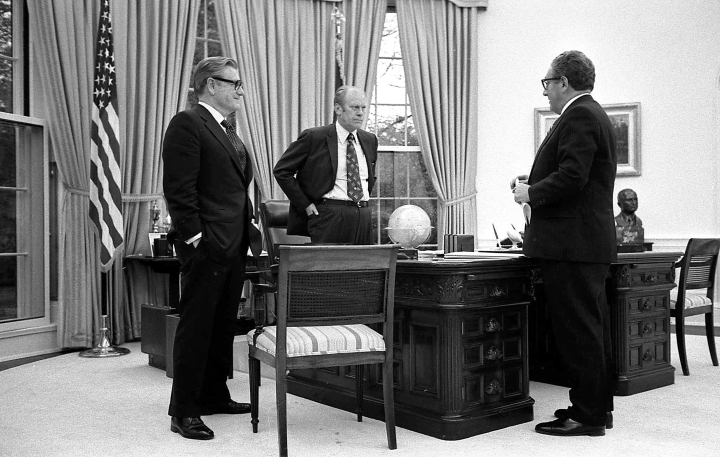Henry Kissinger, who died Wednesday at 100, had a long and complicated foreign policy career that was perhaps most closely associated with the Nixon-era opening of China and the fall of Vietnam, but his work as an adviser early in his career to Nelson Rockefeller ’30 made a lasting impression.
The relationship was so strong that Kissinger had planned to deliver an address the evening before the opening of the Nelson A. Rockefeller Center for Public Policy at Dartmouth on Sept. 24, 1983, four years after Rockefeller’s death, but was called away on other business at the last minute.
But Kissinger did speak at the memorial service in 1979 for the former New York governor and vice president under President Gerald Ford. And his wife, Nancy, was a former aide to Rockefeller.
Kissinger, who was periodically brought in to help write foreign policy speeches for Rockefeller’s presidential campaigns in 1960, 1964, and 1968, and first met the former governor as a graduate student when Rockefeller was a foreign policy adviser to President Dwight D. Eisenhower, recalled that the New York Republican “accumulates experts the way other politicians amass delegates.”
At Rockefeller’s memorial service, Kissinger, the recognized master of realpolitik, said that the former governor demanded that his team of experts tell him not how to manipulate events, but how to do “what is right.”
“ ‘What is right?’ For Nelson Rockefeller this was the quintessential question, both naïve and profound, at once shaming and uplifting. It was the definition of his integrity,” Kissinger told the attendees, who included presidents Gerald Ford and Jimmy Carter, at Riverside Church in New York City on Feb. 2, 1979.
As the Rockefeller Center begins a year-long celebration of its 40th anniversary, Director Jason Barabas ’93 reflected on the meaning of the relationship of these historic policy leaders.
“Nelson Rockefeller valued experts. Kissinger is widely regarded as one of the most influential voices on foreign policy of the 20th century. They had their differences, but they also formed a close working relationship,” Barabas says.
“As we celebrate our 40th anniversary, we reflect on Rockefeller’s commitment to the multiplicity of voices, and his friendship with Henry Kissinger illustrates that perfectly.”

